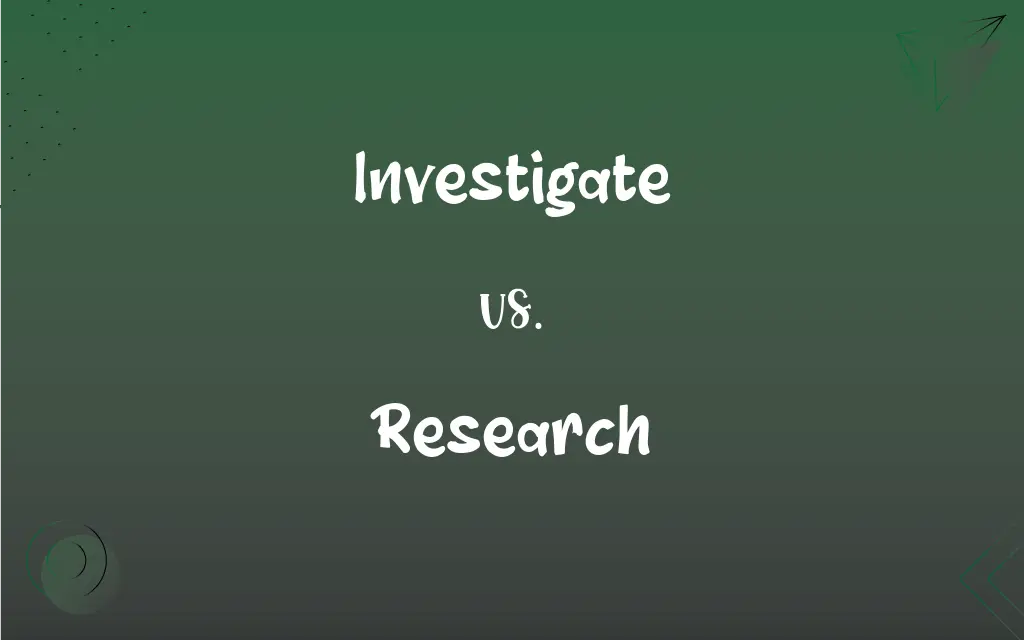Investigate vs. Research: What's the Difference?
Edited by Harlon Moss || By Janet White || Updated on October 7, 2023
"Investigate" means to examine systematically, often in response to something specific, while "Research" is the systematic study of materials and sources to establish facts.

Key Differences
"Investigate" and "Research" are both methods of inquiry, but they are utilized in different contexts and for distinct purposes. When someone seeks to "Investigate," they typically aim to uncover details about a particular incident, allegation, or event. It's a process that is often reactive, sparked by a specific circumstance that demands answers. On the other hand, "Research" is a proactive and systematic process of studying materials and sources to gain new knowledge or understand existing facts better.
Delving into the nuances, "Investigate" frequently has a sense of urgency or immediacy attached to it. Law enforcement agencies "Investigate" crimes, journalists "Investigate" leads, and auditors "Investigate" financial discrepancies. The objective is to gather evidence, establish facts, and often to ascertain accountability. In contrast, "Research" is more expansive and often ongoing. Scientists "Research" to test hypotheses, historians "Research" to understand past events, and businesses "Research" market trends.
Additionally, the methodologies for "Investigation" and "Research" can differ. An "Investigation" may require interviews, surveillance, or forensic analysis. "Research," particularly in academic contexts, often demands literature reviews, experiments, and statistical analyses. The tools for "Investigation" might be a detective's kit, while for "Research," it might be laboratory equipment or archives.
Despite their differences, both "Investigate" and "Research" share a commitment to the truth. Both demand thoroughness, objectivity, and accuracy. While they may have different goals and techniques, both are integral to our understanding of the world around us.
Comparison Chart
Basic Definition
Systematic examination, often in response to something specific.
Systematic study of materials and sources to establish or discover facts.
ADVERTISEMENT
Context
Crimes, allegations, specific events.
Academic, scientific, business inquiries.
Purpose
Uncover details, ascertain accountability.
Gain new knowledge, understand existing facts.
Methodologies
Interviews, surveillance, forensic analysis.
Literature reviews, experiments, statistical analyses.
Sense
Has a sense of urgency or immediacy.
More expansive, ongoing, and proactive.
Investigate and Research Definitions
Investigate
To search out and gather facts.
I'll investigate the reasons behind the sudden price hike.
ADVERTISEMENT
Research
The systematic study to establish facts or principles.
His research on climate change won him an award.
Investigate
To carry out an official examination.
The agency will investigate the company's safety practices.
Research
Diligent and systematic inquiry into a topic.
He's doing research into renewable energy sources.
Investigate
To scrutinize in order to discover the truth.
She hired a private detective to investigate her suspicions.
Research
A detailed study of a subject to discover information.
Her research on the topic took several months.
Investigate
To examine a situation or event systematically.
The police will investigate the theft.
Research
Careful study of a given subject, field, or problem, undertaken to discover facts or principles.
Investigate
To inquire into in detail.
The journalist decided to investigate the politician's background.
Research
An act or period of such study
Her researches of medieval parish records.
Investigate
To observe or inquire into in detail; examine systematically
Investigate a crime.
Investigate ways to use less energy.
Investigate whether the virus is contagious.
Research
To engage in or perform research.
Investigate
To make a detailed inquiry or systematic examination.
Research
To study (something) thoroughly so as to present in a detailed, accurate manner
Researching the effects of acid rain.
Investigate
(transitive) To inquire into or study in order to ascertain facts or information.
To investigate the causes of natural phenomena
Research
To do research for
Research a magazine article.
Investigate
(transitive) To examine, look into, or scrutinize in order to discover something hidden or secret.
To investigate an unsolved murder
Research
Diligent inquiry or examination to seek or revise facts, principles, theories, applications, etc.; laborious or continued search after truth.
The research station that houses Wang and his team is outside Lijiang, a city of about 1.2 million people. File:The research station that houses Wang and his team is outside Lijiang.ogg
Investigate
(intransitive) To conduct an inquiry or examination.
Research
A particular instance or piece of research.
Investigate
To follow up step by step by patient inquiry or observation; to trace or track mentally; to search into; to inquire and examine into with care and accuracy; to find out by careful inquisition; as, to investigate the causes of natural phenomena.
Research
(transitive) To search or examine with continued care; to seek diligently.
Investigate
To pursue a course of investigation and study; to make investigation.
Research
(intransitive) To make an extensive investigation into.
Investigate
Investigate scientifically;
Let's investigate the syntax of Chinese
Research
(transitive) To search again.
Investigate
Conduct an inquiry or investigation of;
The district attorney's office investigated reports of possible irregularities
Inquire into the disappearance of the rich old lady
Research
Diligent inquiry or examination in seeking facts or principles; laborious or continued search after truth; as, researches of human wisdom; to research a topic in the library; medical research.
The dearest interests of parties have frequently been staked on the results of the researches of antiquaries.
Research
Systematic observation of phenomena for the purpose of learning new facts or testing the application of theories to known facts; - also called scientific research. This is the research part of the phrase "research and development" (R&D).
Research
To search or examine with continued care; to seek diligently.
Research
Systematic investigation to establish facts
Research
A search for knowledge;
Their pottery deserves more research than it has received
Research
Inquire into
Research
Attempt to find out in a systematically and scientific manner;
The student researched the history of that word
Research
An endeavor to discover new or collate old facts by scientific study.
She conducted research on ancient civilizations.
Research
Investigation or experimentation aimed at the discovery of truths.
The laboratory is at the forefront of cancer research.
FAQs
In which context is "Investigate" most commonly used?
It's often used in contexts like law enforcement or journalism to probe specific incidents or allegations.
Is "Investigate" typically reactive?
Yes, it's often a response to a specific incident or allegation that requires examination.
Can "Research" be both qualitative and quantitative?
Yes, research can involve qualitative data, quantitative data, or both.
Does an "Investigation" always result in a conclusive answer?
No, some investigations might end without clear answers or may remain ongoing.
Can a journalist "Research" and "Investigate" simultaneously?
Yes, a journalist can research background information while investigating a specific lead or story.
Is "Investigate" limited to crime scenes?
No, investigation can be applied to various scenarios, not just crime scenes.
Can "Research" be done on a historical event?
Yes, historians often research past events to understand them better.
What's the main aim of "Research" in academia?
To gain new knowledge or to provide a deeper understanding of existing facts or principles.
What tools might a scientist use for "Research"?
Laboratory equipment, software for statistical analysis, or databases, among others.
Which word is more proactive: "Research" or "Investigate"?
"Research" is generally more proactive, while "Investigate" is often reactive.
Can a business "Research" market trends?
Yes, businesses often research market trends to make informed decisions.
Which term is more likely associated with experimentation?
"Research" is often associated with experimentation, especially in scientific contexts.
In what situation might an auditor "Investigate"?
An auditor might investigate financial discrepancies or potential fraud.
Can "Investigate" imply an official capacity?
Yes, especially when governmental or organizational bodies probe incidents.
Which term is broader in its scope of inquiry?
"Research" typically has a broader scope, while "Investigate" often focuses on specific events or allegations.
About Author
Written by
Janet WhiteJanet White has been an esteemed writer and blogger for Difference Wiki. Holding a Master's degree in Science and Medical Journalism from the prestigious Boston University, she has consistently demonstrated her expertise and passion for her field. When she's not immersed in her work, Janet relishes her time exercising, delving into a good book, and cherishing moments with friends and family.
Edited by
Harlon MossHarlon is a seasoned quality moderator and accomplished content writer for Difference Wiki. An alumnus of the prestigious University of California, he earned his degree in Computer Science. Leveraging his academic background, Harlon brings a meticulous and informed perspective to his work, ensuring content accuracy and excellence.































































